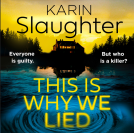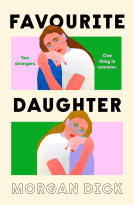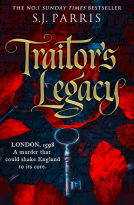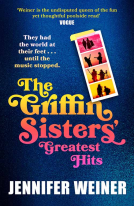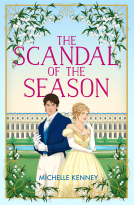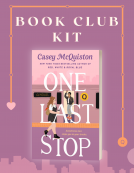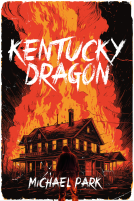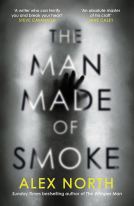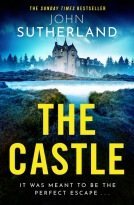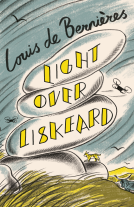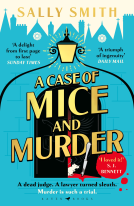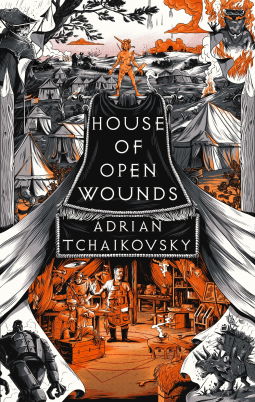
House of Open Wounds
by Adrian Tchaikovsky
This title was previously available on NetGalley and is now archived.
Send NetGalley books directly to your Kindle or Kindle app
1
To read on a Kindle or Kindle app, please add kindle@netgalley.com as an approved email address to receive files in your Amazon account. Click here for step-by-step instructions.
2
Also find your Kindle email address within your Amazon account, and enter it here.
Pub Date 7 Dec 2023 | Archive Date 7 Dec 2023
Head of Zeus | Head of Zeus -- an AdAstra Book
Talking about this book? Use #HouseofOpenWounds #NetGalley. More hashtag tips!
Description
Behind the front lines of a crusade to scour the world of magic, the crew of a field hospital confront the horrors of war. A companion novel to Adrian Tchaikovsky’s award-winning fantasy novel City of Last Chances
City-by-city, kingdom-by-kingdom, the Palleseen have sworn to bring Perfection and Correctness to an imperfect world. As their legions scour the world of superstition with the bright flame of reason, so they deliver a mountain of ragged, holed and scorched flesh to the field hospital tents just behind the front line.
Which is where Yasnic, one-time priest, healer and rebel, finds himself. Reprieved from the gallows and sent to war clutching a box of orphan Gods, he has been sequestered to a particularity unorthodox medical unit.
Led by ‘the Butcher’, an ogre of a man who’s a dab hand with a bone-saw and an alchemical tincture, the unit’s motley crew of conscripts, healers and orderlies are no strangers to the horrors of war. Theirs is an unspeakable trade: elbow-deep in gore they have a first-hand view of the suffering caused by flesh-rending monsters, arcane magical weaponry and embittered enemy soldiers.
Entrusted – for now – with saving lives deemed otherwise un-saveable, the field hospital’s crew face a precarious existence. Their work with unapproved magic, necromancy, demonology and Yasnic’s thoroughly illicit Gods could lead to the unit being disbanded, arrested or worse.
Beset by enemies within and without, the last thing anyone needs is a miracle…
Reviews for City of Last Chances:
‘Paints a vivid detailed backdrop’ SFX
‘Brilliant chaos ensues’ Daily Mail
‘Some of Tchaikovsky’s best prose’ SF Crowsnest
‘An intriguing tangle… ingenious’ Locus
‘Endlessly creative’ Patrick Ness
‘Rich, inventive worldbuilding’ Publishers Weekly
‘Ilmar is vividly alive’ David Towsey
‘A master at the height of his powers’ Ian Green
‘An ambitious epic fantasy read’ Grimdark Magazine
Available Editions
| EDITION | Other Format |
| ISBN | 9781035901388 |
| PRICE | £22.00 (GBP) |
| PAGES | 608 |
Available on NetGalley
Featured Reviews
 Reviewer 281270
Reviewer 281270
I'm not one of those effusive reviewers who fills their reviews with exclamation marks and gifs and claims to be crying and laughing and screaming, but I will say I gave a sharp intake of breath when I saw that City of Last Chances was now a series. Back when I read it, the information said it was going to be a standalone, and when I reviewed it, I wrote:
"I'm incredibly upset that this is currently written as a standalone. This is a world that I need to explore. I need to know what happens to these characters, I want to follow their journeys, I want to visit their homelands. Please write more in this world! "
So. Yeah. House of Open Wounds is book 2 in the City of Last Chances series and I absolutely loved it. If has the same chaotic feel to it, where every second something could go horribly wrong and you never know what's around the corner. But whereas Book 1 is based in a single city, Book 2 takes place in an Army camp, with Yasnic (and God) being forced into servitude in the medical team of the Pel Army. As you can imagine, having your healing skill come with the snag that you'll never be able to do harm again isn't that useful for soldiers... but I can't say much more without revealing anything.
House of Open Wounds has a whole host of brand new odd characters, some with special abilities and Gods of their own, all playing an odd part in the Pel war-machine, and we get a deeper understanding of the Pel Army and its war to bring Correctness to the world. It's a proper page-turning fantasy with deep world-building and amazing characters. Like book 1 the plot isn't really the central point - we're just thrown into this melting pot of craziness and wait for something to happen on every page. The characters reacting to their unfolding situation is the hook, and I simply couldn't put it down. The writing is witty, heart-warming, dark and desperate all rolled into one. This series is probably the closest reminder to Pratchett that I've had, which is some of the highest praise I can give.
Adrian Tchaikovsky is already on my fantasy favourite authors list and I've read everything he's published to date, but I honestly think that this series might be my favourite. And one of the amazing things about being an Adrian Tchaikovsky fan is you never have to wait that long for a new book! Bring on book 3 and pleeeeeease make this a long series, not a trilogy!
 Reviewer 1197813
Reviewer 1197813
House of Open Wounds
Adrian Tchaikovsky
[complimentary pre release review copy from NetGalley]
The Butcher in Hell.
The Necromancer in Grey.
For atheists the Palleseen sure dabble in the darkest of occult to strive toward Perfection.
This is the second volume in Adrian Tchaikovsky's most recent fantasy series. It's one where an atheist empire strives to achieve Perfection and to bring everyone else with them, like it or not. After all, the Ends justify the Means, don't they?
This book and the book before are modern books. I don't mean modern as in mundane today. They are fantastical, dripping with magic and ghosts and gods. However they are modern in the sense that they are about rationalism, ideology, the intersection between ideology, totalitarianism, idealism and corruption. It's 19th Century Europe, the French Revolution takes on a wizardly ancien regime and inevitably becomes a proto Soviet state. In this sense Tchaikovsky is treading a similar Eastern European vibe as Sapowski does in his Witcher books, the decay of idealism into crushing military force weakened by internal corruption.
Now that does sound heavy, doesn't it?
It's not, Tchaikovsky writes beautifully with wit and humour not unremiscent of Pratchett or Gaiman and plots are as inventive and satisfying as either. You laugh at and with unsavoury characters who are both petty, human, awful and with which you have to admit one has a lot of empathy. For example the necromancer who hates the dead and just wants a good cup of tea.
The story is about the Palleseen army at war, an army and war rather like the Great War but also maybe the Great Patriotic War or Desert Storm. It's about the compromises that ideology makes in the face of the unutterable savagery of war; compromises that allow all that the state denounces to exist and be tolerated as long as it advances the cause.
In this bubble exist magisters, necromancers, demonologists, sonorists from all the cultures of this broad canvas Tchaikovsky has prepared for these sagas. Amongst them is Maric Jack, late of Ilmar, and the little dovecote he wears on his back.
This was a great read.
 Aidan C, Reviewer
Aidan C, Reviewer
I have no idea why Adrian Tchaikovsky decided the obvious, obvious follow-up to a 500-page riff on Les Miserables was a fantasy version of M*A*S*H, but I'm so glad he did. House of Open Wounds is tighter, more approachable, and bleaker than its predecessor, and independent enough to almost work as a standalone. Like the battlefield surgery it describes in sometimes-florid detail, House is brutal, and not always completely successful, but its literary torments are all meant to rebuild you, eventually. It's uncut catharsis, and if that's what you're looking for, this is the place. 4.5/5 rounded up.
––––––––––––––
Of course, one good explanation for why Tchaikovsky has taken this particular narrative detour is (*gestures everywhere, especially towards Eastern Europe*), and the narrative's switch from resistance against occupation to gory, inconclusive trench stalemate corresponds neatly to the state of the war in Ukraine even if he never rubs the reader's face in it. It helps that Tchaikovsky's choice to set the story in the camp (if not on the side of) the imperialist Palleseen takes some of the obviousness off the parallel, as does his willingness to humanize many characters who could easily be written off as villains.
This authorial generosity goes beyond obvious anti-hero candidates like the comic relief trickster, Banders, or The Butcher — the chief medico, and a toned-down evocation of Blood Meridian's Judge — but extends to demons, dark gods, Pals pillaging the world of the divine to make more ammunition, mercenary magicians, necromancers, and petty criminals besides. This isn't to say that there are no villains (what would be the fun in that?) or no more-or-less-heroes, but that morality in House lives more in characters' specific actions and attitudes than in fixed identities of "good" and "evil". Perhaps the only unambiguous evil is the war itself, a tremendous, wasteful fire fuelled by life and beauty that leaves behind only mud and bones.
Of course, this is only just one cut through the book, and there's more to House than a reasonable review can cover; I'm still trying to sort out what I think about the story's various call-outs to all three Abrahamic religions, the Catch-22 references, what to make of a slightly saggy patch when the crew changes theatres, or a few somewhat predictable twists at the end. And some of it is unquestionably hard going, even for readers with a tolerance for the literary equivalent of 90% dark chocolate.
But in the end House is a book that's willing to try to break things in the reader in order to set them right, and the world probably needs more of that, when so many things are already broken.
Readers who liked this book also liked:
Jennifer Weiner
General Fiction (Adult), New Adult, Women's Fiction

